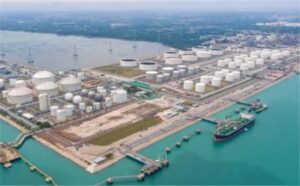 The widening rift between the world’s two largest economies – the United States and China – has had analysts and market observers using the phrase ‘Cold War’ to describe how far the two global superpowers could go in their increasingly heated dispute. A new Iron Curtain could mean attempts to decouple the intertwined economic and trade relations between the biggest economies in the world, market analyst John Kemp argues.
The widening rift between the world’s two largest economies – the United States and China – has had analysts and market observers using the phrase ‘Cold War’ to describe how far the two global superpowers could go in their increasingly heated dispute. A new Iron Curtain could mean attempts to decouple the intertwined economic and trade relations between the biggest economies in the world, market analyst John Kemp argues.
Such decoupling, however, will take decades and may not be even possible, considering the intertwined global supply chains, including in the energy markets. Despite the isolationist policies of the Trump Administration and the trade war with China, the energy trade is globalized, and China plays a huge role in energy flows, including its purchases of U.S. crude oil and liquefied natural gas (LNG).
China is a superpower in the energy markets, and it is the world’s largest crude oil importer. However, Beijing’s growing dependence on imports of oil and natural gas has prompted its policymakers to emphasize strategies to boost energy security by incentivizing domestic oil and gas and coal production and seeking alliances abroad to ensure its energy needs.
Cold War 2.0 or not, China is set to continue influencing the global energy flows.
The Cold War narrative has recently intensified, especially after U.S. Secretary of State Mike Pompeo said in a speech last week, “If we bend the knee now, our children’s children may be at the mercy of the Chinese Communist Party, whose actions are the primary challenge today in the free world.”
“So we can’t face this challenge alone. The United Nations, NATO, the G7 countries, the G20, our combined economic, diplomatic, and military power is surely enough to meet this challenge if we direct it clearly and with great courage,” Secretary Pompeo said.
“Maybe it’s time for a new grouping of like-minded nations, a new alliance of democracies,” he added.
China’s Foreign Ministry Spokesperson Wang Wenbin commented on Secretary Pompeo’s words, saying: “His baseless, fact-distorting speech is full of ideological prejudice and a Cold-War mindset, a mosaic of China-related political lies recently fabricated by senior US politicians. China expresses indignation and firm opposition to it.”
The reciprocal closures of consulates in Houston and Chengdu, China, last week also stoked tensions and added fuel to the Cold War speculation.
According to Dan Coats, who served as director of national intelligence from 2017 to 2019, the deteriorating U.S.-China political and economic relations cannot be seen as a repeat of the U.S.-Soviet Union Cold War because there are too many differences in the global relations thirty years after the fall of the Berlin Wall.
“It is worth recalling that the Soviet Union was not our major trading partner, was not a major holder of our debt and was not tightly interconnected in the supply chains critical to our (and the world’s) economy,” Coats, a former U.S. senator from Indiana, wrote in an opinion piece in The Washington Post.
The U.S. must address its issues with China, but in a coherent manner with a long-term vision – a Cold War mentality would only exacerbate disputes, Coats wrote.
Source: “Could Rising US-China Tensions Change Global Energy Markets?”, world-energy.org
